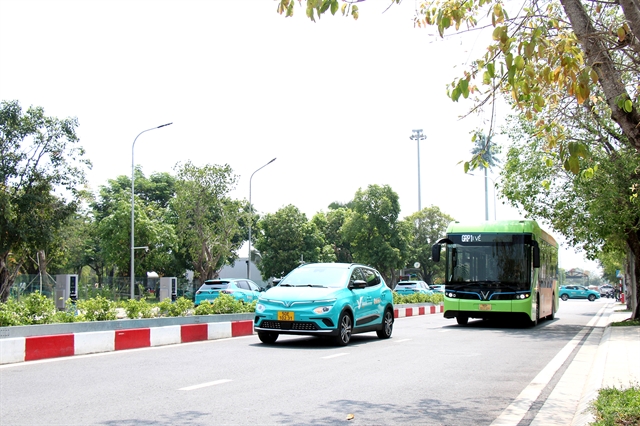 Economy
Economy

 |
| A electric taxi of Xanh SM. — VNA/VNS Photo Tiến Lực |
HÀ NỘI — Deputy Prime Minister Lê Minh Khái has asked the Ministry of Transport to study support policies to encourage and create favourable conditions for taxi companies to switch to using electric vehicles.
Electric vehicles reduce carbon emissions and protect the environment, but traditional taxi firms are still hesitant to convert to electric, or to hybrids, to replace petrol and diesel vehicles, over worries about the shortage in the charging infrastructure.
Vinasun last week introduced the first hybrid taxi services in Việt Nam and signed a strategic deal with Toyota, with a view of investing into 2,000 hybrid cars in 2025.
Hybrid vehicles can help reduce fuel costs by 50 per cent compared to petrol-powered cars, Vinasun Deputy Director General Trần Anh Minh said.
It is estimated that it costs around VNĐ800 for an electric vehicle to run one kilometre while the fuel consumption of hybrid vehicles is VNĐ1,100-1,200 per km.
Taxi firm Mai Linh has a deal with Toyota to bring in a total of 9,999 hybrid cars over the next three years. The company said that electric vehicles have not really been suitable and optimal in Việt Nam, because of infrastructure inadequacy, as well as risks related to battery dumping.
According to Nguyễn Công Hùng, chairman of the Hà Nội Taxi Association, electric vehicles can run around 200-300km after each charging and this is a limitation when comparing electric vehicles with petrol cars or hybrids.
Hùng said that with around 150,000 electric vehicle charging points across the country, the charging infrastructure still fails to meet the demand of electric vehicle owners and more than 5,600 taxies of Xanh SM. In addition, it takes up to six hours to fully charge a battery at the charging station.
There are also currently no detailed regulations for transport service companies about the use of electric vehicles, such as how to ensure safe charging or how to handle battery waste, he said.
Competition in the taxi industry is growing ever harder, especially against the ride-hailing services, Nguyễn Thị Ngọc Trang, director of transport services cooperative Sen Việt in HCM City said.
In that context, many cooperatives have not had or been able to find resources to invest in electric vehicles.
Phùng Đăng Hải, chairman of HCM City’s Cooperative Alliance, cooperatives need support from the Government to replace fuel-powered vehicles by electric vehicles.
Countries around the world such as India, China and Europe have been successfully encouraged conversion to electric cars thanks to the Government’s strong support policies.
If the Government have detailed support policies, taxi companies will have grounds for calculations to decide their investment in electric vehicles, Phạm Xuân Mai, former head of Transport Engineering Faculty under HCM City University of Technology, said. — VNS




